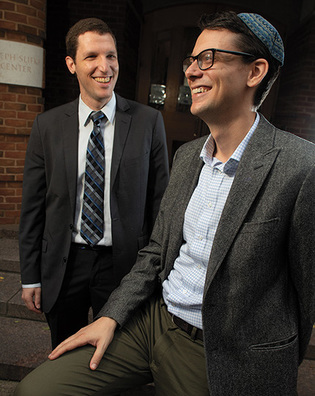 loading
loading
MilestonesTwo new leaders for Slifka Center“A space for students to create a community of meaning.”  Mark OstowExecutive director Uri Cohen (left) and chaplain Jason Rubenstein were appointed this summer to run Yale’s center for Jewish life. View full imageRabbi Jason Rubenstein grew up as “a serious math and science kid” who wrote computer programs in his spare time. Uri Cohen started his professional life studying the telecom sector. Each found a calling within the Jewish community, and now Rubenstein and Cohen are, respectively, Yale’s new Jewish chaplain and the executive director of Yale’s Joseph Slifka Center for Jewish Life. Appointed over the summer, the two are jointly shepherding the Slifka Center into its next phase. The Slifka Center is home to Yale Hillel, the university’s chapter of the world’s largest Jewish campus organization. Both men credit their own undergraduate Hillel experiences—Rubenstein’s at Harvard, Cohen’s at Penn—with transforming the way they thought about themselves and their lives. Prior to his Yale appointment, Cohen (who also holds a master’s in public administration from New York University) spent seven years as executive director of Queens College Hillel. He oversaw major changes to its facilities and programming and, under his leadership, participation in Hillel activities more than quadrupled. Among the speakers who came to the Queens campus was Rubenstein—the only speaker whom the students asked back year after year, Cohen says. “They connected with his authenticity as a Jewish scholar and role model.” A graduate of the Jewish Theological Seminary, Rubenstein comes to Yale from the Hadar Institute, a traditional egalitarian yeshiva in Manhattan where he taught for the past eight years. He sees the Jewish tradition as extensive, diverse, and challenging, providing opportunities for self-discovery, community building, spiritual growth, and deep intellectual engagement. One conversation at Slifka examined Talmudic perspectives on the choice of Brett Kavanaugh ’87, ’90JD, for the Supreme Court; at the Law School, Rubenstein recently spoke on the Torah’s political legacy and its connection to the current refugee crisis. “Most important,” says Rubenstein, “is that we provide space for students to create a community of meaning with and for one another.” Adds Cohen, “College is the first opportunity for young people to make their own decisions as adults. Our job is to foster an environment in which students can explore how to make adult choices that are informed by and embrace Jewish values.”
The comment period has expired.
|
|